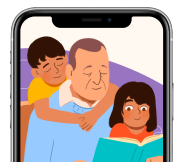I grew up in a family where there was a particular emphasis on genealogy. As far back as I can
remember, we had photo albums and books of family history with lineage, stories, and
photographs of my ancestors. This is probably why I went on to earn a BA and MA in history,
and become a history teacher.
I learned the importance of knowing and preserving your family’s history at an early age. Here
are my top three reasons why I recommend that everyone should study their family history.
1. It is genuinely interesting!
Looking through your family history can lead to very interesting discoveries! For example, I
found out that I am descended from Charlemagne, known to historians as the first Holy Roman
Emperor and one of the greatest rulers in history. I’m also related to George Washington,
Thomas Edison, and Martin Luther. It’s fascinating!
But knowing your family history can be funny too. It turned out I’m related to Charlemagne
through his grandson Charles the Bald, which might explain why my brother lost his hair at the
age of 16.
Between myself and my friends, I have known people related to rulers and slaves, politicians and
freedom fighters, inventors and explorers, all from every continent and most major cultures.
2. Genealogy connects you to something bigger
I attended a small private university in Hawaii, where students attended from more than 75
countries. I remember attending a church activity with people from places like Mongolia, Samoa,
Fiji and more. We all examined our family history to find if we were related to each other
somehow.
The results were surprising! While not everyone in the room was related to everyone else, people
from all parts of the globe were cousins! I was 9th cousins with someone from Mongolia, who in
turn was 4th cousins with someone from Australia! We all learned we were one big family, and it
drove us closer together as friends and as a community.
Finding your roots can also connect you more deeply with your culture. Our culture defines how
we live and interact with others, even if that culture changes or shifts over generations. Knowing
your culture is very important in a world that is so interconnected, where it can be easy to lose
track of where you come from.
Finding your cultural roots can teach you a lot about yourself and help you connect with
something bigger than yourself. This can be particularly comforting when you find yourself
feeling lonely, or struggling to find an identity of your own.
3. Learning your family history can help with hard times
It’s no secret that we live in a tough world. Everyone goes through toils and troubles. We lose
loved ones, find ourselves in financial difficulties, and experience all sorts of traumas all on a
wide scale of intensity
But so has everybody before us. Learning the stories of our ancestors’ struggles can give us hope
and courage to persist through our own difficult times. If they made it through their times, maybe
we can too.
n recent years I learned about my grandfather’s mother, Anna Sampson, who never knew her
own father. Her mother was “loose and wild,” as other family members have put it, and
abandoned Anna at a young age. She was raised by extended family, and was a teenager during
the Great Depression. I see what similar family situations do to my students today, and know it
can’t have been easy.
But I also learned that her life improved. Living with her extended family introduced her to a
young man down the road who became her friend, then her husband of 62 years. I learned from
her that all bad times are temporary.
Conclusion
Family history can teach us much about the world, and about ourselves. It can help us through
hard times, connect us to a much bigger world, and entertain us. We can find ourselves, define
our identities, and find courage to overcome struggles through the stories and memories of those
who came before us.
I strongly encourage you to explore your family history, and use whatever resources you can to
preserve your own memories of your life, and of those who came before you. This is where Lalo
comes in.
Lalo helps to preserve these sources, and to share them with family members. You can share in
the love, connections, and empathy of others in a friendly social media setting. You can preserve
the memories of your children as they grow, or trace back the stories of family members who
have passed.













 and
and  by the best team in the Milky Way
by the best team in the Milky Way